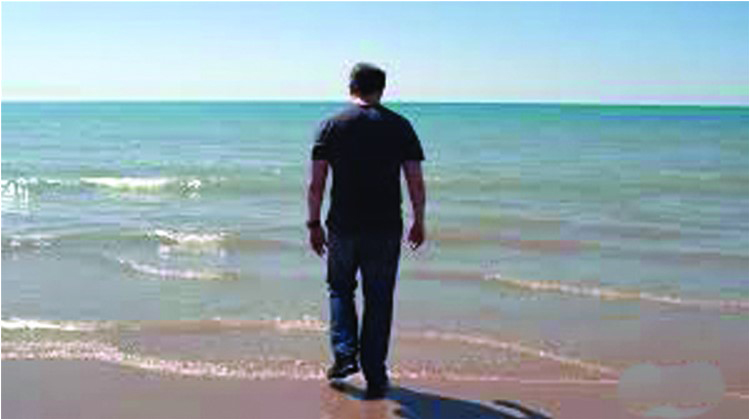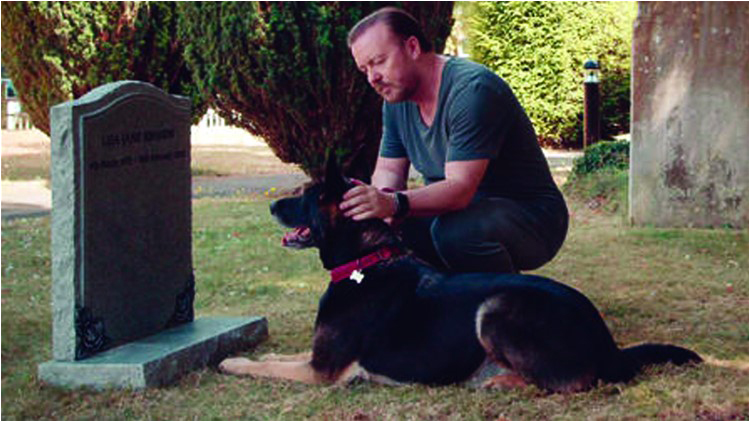
A heartbroken, sullen writer in his late forties, Tony Johnson, played by Ricky Gervais, is dealing with the demise of his wife in a small English town. He is suicidal and brutal; provoking every single person he encounters every day. He believes he has a superpower, in that he is not weighed down by the disadvantage of having to be nice and thoughtful.
“He is not himself at the minute”, says Mr. Braden as he introduces him to a new employee.
“Humanity is a plague; we are all disgusting, narcissistic, selfish parasites and it should be everyone’s moral duty to kill themselves” is how Tony introduces himself to the same employee.

After Life offers a soulful emotional retreat for the times we live in. It is for the bitter, the depressed and the inconsolable with a sliver of hope at the end. Available on Netflix, After Life is a man’s struggle to rise above his circumstances and deal with life’s toughest blow.
In Freudian terms, Tony is driven solely by his id. No social conditioning, no niceties: his new self is as honest as a child – except that this child abundantly uses expletives to express even the minutest of inconveniences he encounters every day. This absolute lack of a filter is a refreshing portrayal of a protagonist. The only thing that’s going to make him happy is his wife and since she is not around, he sees no point in even trying.
Tony develops unusual relationships throughout the course of 6 episodes. He hires a sex worker to do his dishes and cleaning, a newspaper delivery guy becomes his drug supplier and an old lady he meets at the graveyard becomes his therapist. There is a wise old woman, Anne (played by Penelope Wilton), who lost her husband after 48 years of marriage. She visits his grave often, out of habit, to share daily mundane details. Tony and Anne develop a therapeutic dynamic; she calls him out on his insensitive behavior and for a change, he listens.

Tony does seek the help of a qualified therapist, but he turns out to be an awfully self-absorbed character, who is least concerned about his patients.
With constant flashbacks and video messages left by Tony’s wife Lisa, the audience remains engulfed in his pain. His pain becomes even more vivid as viewers can compare the contrasting personality of a lively, vivacious Tony with his wife in their home videos and the surly Tony watching them in the present moment while contemplating his suicide.
One of the most remarkable characters is that of the nurse, Emma, taking care of Tony’s Alzheimer-ridden father. In one of her earlier exchanges with Tony, she calls him a troll on Twitter: just because he is upset, he wants to make sure everyone else is too. She is a ray of much-needed sunshine in an otherwise rather gloomy show. They develop a romantic rapport gradually. However, this was a character that required more depth and build-up for the show’s own good – and yet was unpleasantly under-written.

Without sounding too preachy, After Life aims to address the emotional and psychological trauma triggered by the death of a loved one. That person can be the centre of your universe, like in Tony’s case but you would still have to move on. The show is trying to make a statement here that even the most gut-wrenching pain is impermanent. Tony tries to end his life twice but falls shy at the very last minute. He blames his dog intervening for food just when he is at the brink of doing the final deed but we as the audience can sense there is a deeper layer to this simple explanation. As Mattz Haig puts it, you are not your feelings, you just experience them: anger, sadness, hate, depression and fear. This is the rain you walk in but you don’t become the rain. You know the rain will pass, and that is the gist of After Life.
The show has earnest dialogues and is made with a sincere effort to hit the viewer emotionally. It is written and directed by Ricky Gervais, who is running more or less a one-man show by starring as the main lead as well. So if you are familiar with the mastermind behind The Office, consider After Life for your next weekend binge and hopefully it will be a cathartic experience.
“He is not himself at the minute”, says Mr. Braden as he introduces him to a new employee.
“Humanity is a plague; we are all disgusting, narcissistic, selfish parasites and it should be everyone’s moral duty to kill themselves” is how Tony introduces himself to the same employee.

After Life offers a soulful emotional retreat for the times we live in. It is for the bitter, the depressed and the inconsolable with a sliver of hope at the end. Available on Netflix, After Life is a man’s struggle to rise above his circumstances and deal with life’s toughest blow.
In Freudian terms, Tony is driven solely by his id. No social conditioning, no niceties: his new self is as honest as a child – except that this child abundantly uses expletives to express even the minutest of inconveniences he encounters every day. This absolute lack of a filter is a refreshing portrayal of a protagonist. The only thing that’s going to make him happy is his wife and since she is not around, he sees no point in even trying.
Tony develops unusual relationships throughout the course of 6 episodes. He hires a sex worker to do his dishes and cleaning, a newspaper delivery guy becomes his drug supplier and an old lady he meets at the graveyard becomes his therapist. There is a wise old woman, Anne (played by Penelope Wilton), who lost her husband after 48 years of marriage. She visits his grave often, out of habit, to share daily mundane details. Tony and Anne develop a therapeutic dynamic; she calls him out on his insensitive behavior and for a change, he listens.

Tony does seek the help of a qualified therapist, but he turns out to be an awfully self-absorbed character, who is least concerned about his patients.
With constant flashbacks and video messages left by Tony’s wife Lisa, the audience remains engulfed in his pain. His pain becomes even more vivid as viewers can compare the contrasting personality of a lively, vivacious Tony with his wife in their home videos and the surly Tony watching them in the present moment while contemplating his suicide.
One of the most remarkable characters is that of the nurse, Emma, taking care of Tony’s Alzheimer-ridden father. In one of her earlier exchanges with Tony, she calls him a troll on Twitter: just because he is upset, he wants to make sure everyone else is too. She is a ray of much-needed sunshine in an otherwise rather gloomy show. They develop a romantic rapport gradually. However, this was a character that required more depth and build-up for the show’s own good – and yet was unpleasantly under-written.

After Life offers a soulful emotional retreat for the times we live in. It is for the bitter, the depressed and the inconsolable with a sliver of hope at the end
Without sounding too preachy, After Life aims to address the emotional and psychological trauma triggered by the death of a loved one. That person can be the centre of your universe, like in Tony’s case but you would still have to move on. The show is trying to make a statement here that even the most gut-wrenching pain is impermanent. Tony tries to end his life twice but falls shy at the very last minute. He blames his dog intervening for food just when he is at the brink of doing the final deed but we as the audience can sense there is a deeper layer to this simple explanation. As Mattz Haig puts it, you are not your feelings, you just experience them: anger, sadness, hate, depression and fear. This is the rain you walk in but you don’t become the rain. You know the rain will pass, and that is the gist of After Life.
The show has earnest dialogues and is made with a sincere effort to hit the viewer emotionally. It is written and directed by Ricky Gervais, who is running more or less a one-man show by starring as the main lead as well. So if you are familiar with the mastermind behind The Office, consider After Life for your next weekend binge and hopefully it will be a cathartic experience.

